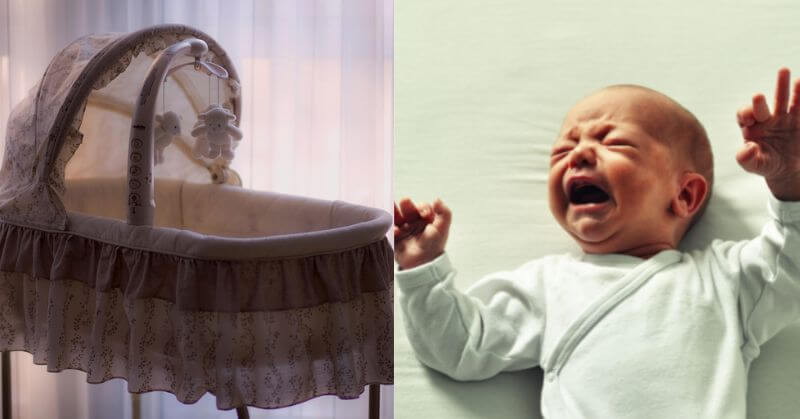Being a parent brings joy like no other. It is, however, full of challenges at every step of raising a child. One of the things that you will face with your little one is an 8 month sleep regression. Confused as to what that is and how to deal with it? Read on to learn everything about it!
What Is 8 Month Sleep Regression In Infants?
The 8-month sleep regression in infants refers to a period of disrupted sleep patterns that typically occurs around the age of 8 months.
Sleep regressions are periods when a baby who was previously sleeping well may suddenly start experiencing difficulties in falling asleep, staying asleep, or waking up frequently during the night. This can be a challenging time for both infants and their parents.
Who Faces 8-Month Sleep Regression?
The 8 month sleep regression is a common developmental phase that many infants experience around the age of 8 months.
It is not specific to any particular group of babies and can occur in children of different genders, ethnicities, or backgrounds.
Sleep regressions are a natural part of an infant’s development and affect a significant number of babies.
The timing of sleep regressions, including the 8-month sleep regression, can vary slightly from one baby to another. Some babies may experience it closer to 7 months, while others may go through it a little later, around 9 months.
The important thing to remember is that sleep regressions are a normal and temporary phase in an infant’s growth journey.
Signs Of 8 Month Sleep Regression
- Increased night waking
- Difficulty falling asleep
- Shorter naps
- Changes in sleep routine
- Restlessness during sleep
- Increased clinginess
- Nightmares or night terrors
- Increased appetite
- Regression in sleep milestones.
Causes For 8 Month Sleep Regression
1. Cognitive development
At around 8 months, infants go through significant cognitive milestones, such as increased awareness of their surroundings, object permanence (knowing objects still exist even when they can’t see them), and improved motor skills.
These developments can lead to increased mental activity and may cause sleep disturbances.
2. Separation Anxiety
Around 8 months, babies often become more aware of their attachment to their primary caregivers. This newfound awareness can trigger separation anxiety, making it difficult for them to settle down and sleep without their caregiver nearby.
3. Teething
Many babies start teething around 6 to 8 months of age, and this can cause discomfort and pain, which may disrupt their sleep.
4. Changes in Routine
Changes in daily routines, such as starting daycare, traveling, or any other significant life event, can also impact an infant’s sleep patterns.
How Long Does 8-Month Sleep Regression Last?
The duration of the 8 month sleep regression in infants can vary from baby to baby. On average, sleep regressions typically last for a few weeks, usually around 2 to 6 weeks.
However, some babies may experience shorter regressions that last only a week or two, while others may have more prolonged disruptions that last up to six weeks or even longer.
During this phase, you may notice changes in your baby’s sleep patterns, such as increased night waking, difficulty falling asleep, shorter naps, or changes in sleep duration.
These disruptions are often associated with developmental milestones, such as increased cognitive awareness, motor skills development, and separation anxiety.
Solutions For 8 Month Sleep Regression

There are a lot of solutions to resolve this issue of regression. Here are some popular ones:
1. Stick to a consistent sleep schedule
Maintain a regular sleep routine, including fixed nap times and a consistent bedtime, to help regulate your baby’s internal clock and promote better sleep.
2. Create a Calming Bedtime Routine
Establish a soothing pre-sleep routine to signal to your baby that it’s time to wind down and prepare for sleep. A warm bath, gentle massage, reading a book, or singing lullabies can be part of this routine.
3. Offer Comfort and Reassurance
During this phase, your baby may need extra cuddling and reassurance to help them settle back to sleep when they wake up at night. Respond to their cries promptly and provide comfort as needed.
4. Encourage self-Soothing
While it’s essential to offer comfort, try to encourage your baby to develop self-soothing skills. This can involve allowing them a few moments to try and fall back asleep independently before intervening.
5. Consider Sleep Associations
Evaluate if any sleep associations, such as nursing, rocking, or using a pacifier, may be disrupting your baby’s ability to fall asleep or return to sleep on their own. Gradually weaning off these associations can promote better sleep independence.
6. Create a Sleep-Conducive Environment
Make sure your baby’s sleep environment is comfortable, safe, and conducive to sleep. A dark, quiet, and cool room can help promote better sleep.
7. Address Teething Discomfort
If your baby’s sleep regression coincides with teething, consider using teething remedies or consulting your pediatrician for appropriate pain relief options.
8. Be Patient and Consistent
Sleep regressions are temporary, and it’s essential to be patient during this phase. Stay consistent with your routines and approaches, as this can help your baby adjust more quickly.
9. Limit Daytime Sleep Disruptions
Ensure that daytime naps are consistent and not excessively long, as tiredness during the day can lead to more significant sleep problems at night.
10. Seek support and Take Care of Yourself
Reach out to family and friends for support during this challenging time. Ensuring that you take care of your own well-being, including getting adequate rest, can make it easier to cope with your baby’s sleep regression.
11. Taking Care Of The Baby and Mother During 8 Month Sleep Regression
During the 8 month sleep regression, parents might notice their baby waking up more frequently at night, needing extra reassurance to fall back asleep, or experiencing shorter naps during the day. It’s important for parents to be patient and understanding during this phase.
When To See A Doctor For 8 Month Sleep Regression
Remember, every baby is different, and while some may experience noticeable sleep disruptions during this time, others might not be as affected. Consider consulting your pediatrician for further guidance and support if:
Extreme and persistent sleep disruptions
If your baby’s sleep disruptions are severe, frequent, and persistent, and if they last for more than a few weeks, it’s a good idea to seek medical advice. Unusual changes in sleep patterns that seem unrelated to developmental milestones may require further evaluation.
Signs of illness or discomfort
If your baby exhibits other signs of illness, such as fever, excessive irritability, persistent crying, or unusual symptoms, it’s important to consult a doctor to rule out any underlying health issues.
Failure to thrive
If your baby’s sleep disruptions are affecting their overall growth and development, such as a noticeable decline in weight gain or other developmental milestones, it’s crucial to seek medical attention.
Concerns about feeding or nutrition
If the sleep regression is coinciding with changes in feeding patterns, refusal to eat, or other feeding-related concerns, discussing these issues with a healthcare professional can be beneficial.
Parental distress
If the sleep regression is causing significant distress for parents or caregivers, leading to sleep deprivation, stress, or feelings of being overwhelmed, it’s essential to seek support and guidance from a healthcare professional or a pediatric sleep specialist.
Safety concerns
If the sleep disturbances lead to unsafe sleep practices, such as co-sleeping in unsafe conditions or bed-sharing when not recommended, it’s crucial to discuss safer sleep options with a doctor.
FAQs Regarding 8 Month Sleep Regression
Should I be concerned if my baby’s sleep regression lasts longer than a few weeks?
While sleep regressions are generally temporary, if you have concerns or the sleep disruptions persist beyond what you consider normal for a sleep regression, it’s a good idea to consult with your pediatrician to rule out any underlying issues.
Can teething contribute to the 8 month sleep regression?
Yes, teething can be a factor in disrupting your baby’s sleep during the 8 month regression. Teething discomfort may cause additional waking and restlessness.
Are sleep regressions the same for all babies?
No, every baby is different, and while many infants experience sleep regressions, the intensity and duration can vary between individuals.
Can I sleep train my baby during the 8 month sleep regression?
Sleep training during a regression can be challenging and may not yield the same results as sleep training during more settled periods. Some experts recommend waiting until the regression passes to begin or continue with sleep training.
Is the 8 month sleep regression related to a growth spurt?
The 8 month sleep regression is more closely tied to cognitive and emotional developmental changes rather than a growth spurt. However, growth spurts can also disrupt sleep in babies at various stages.
Is it safe to bed-share during the 8 month sleep regression?
It’s generally not recommended to bed-share with an infant due to safety concerns. Instead, consider setting up a safe sleep environment in your baby’s crib or bassinet.
Also Read: Understanding Soy Allergy In Babies
Tinydale is on YouTube, Click here to subscribe for the latest videos and updates.
Follow Us: Facebook | Instagram | Twitter | Youtube | Pinterest






